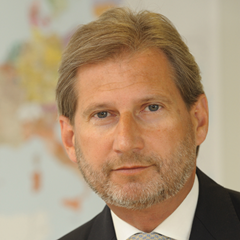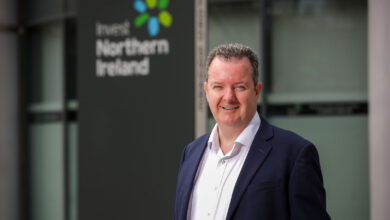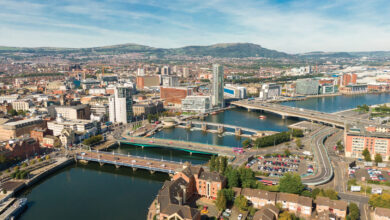Commissioner Johannes Hahn: delivering in the regions
 Europe’s Regional Commissioner, Johannes Hahn, shares his vision for the regions. A focus on results is essential as policy takes a more economic turn and urban areas need special attention.
Europe’s Regional Commissioner, Johannes Hahn, shares his vision for the regions. A focus on results is essential as policy takes a more economic turn and urban areas need special attention.
In June, I was granted the great privilege to officially open the Peace Bridge over the River Foyle in Northern Ireland. This bridge is a perfect example of what regional policy in my view stands for: improving the life of citizens, bringing communities together, giving them more economic opportunities and revitalising urban areas.
As Commissioner for Europe’s regions, I want to deliver a policy both relevant and appropriate for the economic situation of today. We need a strong development and investment policy, supporting structural adjustment across Europe, investing in the competitiveness of poorer regions, while also supporting regions in decline, confronted with rising unemployment and pockets of deprivation.
Our aim is to bring regional policy in line with the Europe 2020 strategy, outlining the framework for the EU’s economic, social and environmental development for the next decade, preparing us for global competition. Regional investment will have to focus on a limited number of priorities driving smart, green growth for all. Regional policy must provide the targeted investment needed to create a competitive, connected and more energy efficient economy.
To achieve this, we need further simplification of the rules. We need to pool resources between public and private sectors and to maximise their impact, with more focus on results. We must analyse the impact of investment, to see what works and why, and tell taxpayers what has been achieved with their money, yielding results for all citizens. As in Northern Ireland and in all other parts of Europe, we are faced with a trend towards urbanisation and dependency of rural residents on urban areas. We need to address the challenges they face, and indeed those they create for the EU, by consolidating a strong European urban agenda.
Regional policy has adopted a multi- pronged approach, enhancing the coherence of European investment through closer co-ordination with other EU policies. Stakeholders and decision- makers at all levels must be at the heart of regional policy, and local and regional bodies, as well as cities, need to be key partners in the design and delivery of programmes tailored to needs on the ground.
Current discussions on the policy after 2013, when the current financial planning period ends, aim to further improve the impact of the investments done. While covering the entire EU, it will continue to concentrate investment in the regions that still have to catch up, but obliging all member states to focus on growth- oriented, innovative projects, such as NISP Connect, a business support service fostering entrepreneurship in the hi-tech field and focussing on technology-led start-up ventures, or other such innovative initiatives.
Co-operation as catalyst
In Europe today, regional co-operation and sharing of experience is a catalyst to sustainable development and, as such, territorial or cross-border co-operation must remain at the heart of regional policy. The experimental macro-regional strategies aim to add an additional level. Many challenges, like pollution, go beyond administrative borders, underlining the need to continually seek common solutions to shared problems.
The fledgling macro-regional strategy for the Baltic Sea and the one recently approved for the Danube region represent a new form of co-operation in the area. Without creating new institutions, they aim to draw on the region’s strengths. This approach is a pilot project for the EU, a showcase for efficient co-operation. It is especially useful for the Europe 2020 strategy, to orient all territorial initiatives to promote smart, socially inclusive and sustainable growth.
Urban areas have a key role to play in future regional funding and in achieving green growth. Cities are engines for innovation, competitiveness and job creation; they are the power bases of our knowledge economy and as such, they must remain at the forefront of our strategy.
The urban dimension is complex. Combating poverty, which remains a major theme of regional policy, poses a particular challenge in urban areas. Likewise, 70-80 per cent of CO2 emissions take place in cities, so if we want to fight climate change and improve energy efficiency for businesses and citizens, solutions have to come from there.
Around four-fifths of Europe’s citizens live in urban areas and the issues they face daily are entirely in line with the 2020 goals. If we can, for instance, reduce traffic and improve the use of public transport, or if we improve the energy efficiency of buildings, or aim for urban regeneration instead of urban expansion, then we are well on our way to achieving those targets.
Bringing people together to live in peace has always been a key objective of the European Union, promoting a common respect both for shared values, diversity and mutual economic development.
After my recent visit to Northern Ireland, I have seen first-hand an example of this objective in action and the peace process there is serving as a beacon of hope for conflict zones around the world. Of course, peace and prosperity cannot be taken for granted. Therefore we have to build a modern, dynamic regional policy, in order to provide the best conditions for shared prosperity in future.
Regional Commissioner
Three years as Austria’s Science and Research Minister prepared Johannes Hahn for his appointment to the European Commission in February 2010. Born in 1957, he is married with one son and is a member of the centre-right Austrian People’s Party.
Regional policy was allocated a €347 million budget over 2007-2013. Under the NUTS (Nomenclature of Territorial Units for Statistics) system, the EU has three levels of regions:
• NUTS 1 (97 major socio-economic regions);
• NUTS 2 (271 basic regions for regional policy);
• NUTS 3 (1,303 regions for more specific analysis).
Northern Ireland is a region at the first two levels, and is divided into five NUTS 3 regions: Belfast, Outer Belfast, East, North, and West and South.






